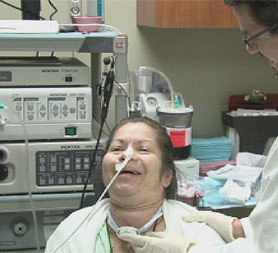Doctors celebrate ‘miracle’ larynx transplant
An American woman who lost her voice for more than a decade has had her speech restored after receiving a new larynx in a groundbreaking operation, writes Science Correspondent Tom Clarke.
Before her operation Brenda Charrett Jensen could only speak with the aid of an electronic device. Even a phone call was difficult. She says people would hang up on her thinking she was a computerised marketing call.
Her own voice box, or larynx, was destroyed by complications after a kidney transplant operation 12 years ago.
But she now has a near-normal voice again thanks to the landmark procedure that’s replaced her broken larynx with one from a donor.
It’s a procedure that was carried out once before in 1998. The recipient of that larynx transplant is still speaking well after 12 years. However it’s expected Ms Jensen’s voice, ability to breathe and swallow are expected to be much more natural than the previous transplant recipient’s.
Why? Over the last decade Martin Birchall, a laryngeal surgeon at University College London, has been perfecting ways to rewire damaged nerves into a transplanted larynx. He supervised the Californian surgeons who carried out the transplant.

The techniques he developed use other nerves in the neck to bypass damaged areas and restore near-normal function to the donated larynx. This is crucial if Ms Jensen is able to properly swallow, taste and smell again – as well as breathe.
Martin Birchall told Channel 4 News he has been amazed at how quickly Ms Jensen has recovered the ability to speak. They are now confident they will soon be able to remove the tracheotomy tube in her throat that she has relied on for breathing since her previous larynx was damaged.
Brenda Jensen was ideal for the experimental procedure not just because she needed a new voice box. She was already taking anti-rejection drugs for her kidney transplant. That meant she wouldn’t reject her new voice box either.
For that reason the procedure won’t help the majority of those who could benefit. Most people who permanently lose their voice are cancer patients who have undergone laryngectomy – removal of the larynx. However, anti-rejection drugs can be dangerous for people who have had cancer making them unsuitable transplant recipients.
But surgeons have demonstrated a very complex and finely tuned organ can be transplanted, and reconnected, to make it function nearly normally. That is a step forward for people who have lost their larynx, and for transplant medicine as a whole.
-
Latest news
-
As India goes to the polls in the world’s largest election – what do British-Indians think?6m

-
Tees Valley: Meet the candidates in one of the biggest contests coming up in May’s local elections4m

-
Keir Starmer says public sector reform will be a struggle7m

-
Nicola Sturgeon’s husband Peter Murrell charged with embezzlement of funds from SNP1m

-
Ukraine might finally get $60billion in American weapons and assistance to defend against Russia3m

-




